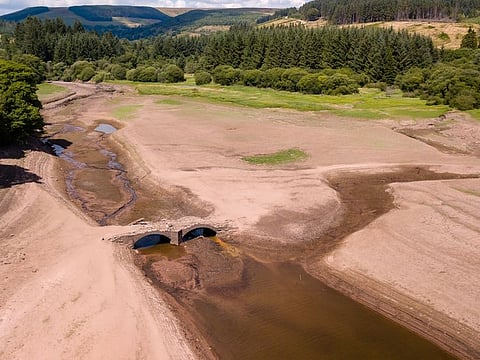Why UK faces water shortages despite record rainfall
Britain’s water woes are tied to how we’ve exploited our natural resources

England just had its wettest 18 months on record. So the fact that the UK is still at risk of water shortages this summer is a damning indictment of how poorly managed the country’s water supplies are.
A large part of the reason is that we’ve altered our land so that water gushes quickly through the landscape and out to sea, rather than being stored in wetlands, rivers and aquifers. Rivers have been straightened and channelised. Vast swathes of wetland have been drained for grazing and agriculture. Absorbent natural environments have been replaced with slick surfaces — car parks, patios, paving stones — that contribute to the fast flow of water into ageing sewers. The result is more flooding and less stored water.
Of course, England and Wales’ unique system of privatised water companies doesn’t help matters. These water monopolies have been accused of neglecting much-needed infrastructure investments so that they can pay their shareholders large dividends. The result is that an average of 113 litres of water per property per day is lost to leaks, and Britain is dealing with an epidemic of sewage spills. This is particularly galling as water bills are also being hiked.
The solution will require action from all directions. Water companies and regional water groups are finalising long-term plans for how they’ll secure future water supplies over the next 25 years and beyond. Those plans include proposals for seven new reservoirs, five new water recycling schemes, four new desalination plants and intercompany transfers to share resources.
We’ll also need to use less water — that means companies fixing leaks at the same time as households and businesses using water more efficiently. Desalination and water recycling in particular will help Britain break free from its reliance on rainfall, but none of these actions will do anything to solve the wet season’s flooding problem.
That’s why the UK should place more emphasis on nature-based solutions for its water woes, many of which can help bolster supply, protect homes from flooding and come with a litany of other benefits including carbon sequestration and enhanced biodiversity.
Take, for example, the reintroduction of beavers to East Anglia. Five years ago, the first pair of these once-native rodents in the region for 400 years were given free reign of a 10-acre woodland stream. The results of the pilot study showed that the beaver family, now numbering 11, reduced the impact of flooding and drought by constructing dams that store an estimated 3 million litres of water in ponds.
Improving water quality
By building increasingly bigger dams each time it rained, beavers ensure that storm water flows downstream more slowly, sometimes holding it back for several months. Releasing beavers into the wild in suitable areas could bring tremendous benefits — for little human legwork. Anglian Water has provided some funding for larger enclosures on the same East Anglian estate, opening the door for other companies to follow suit in their regions.
In the UK, degraded peat emits more CO2 than all its trees sequester. But rewetting bogs does more than reduce emissions — it can also reduce flooding downstream, make water supplies more resilient and improve water quality.
It seems like this is being embraced by at least some water companies. At the British Water Annual Conference in November, United Utilities announced that it’s planning to increase expenditure on nature-based solutions from £20 million ($25.3 million) for the 2020-2025 period to more than £500 million between 2025 and 2030.
For too long now, the UK water sector has been exploiting our natural resources, rather than working with the ecosystems they rely heavily on. Now is the time to change the narrative through action and investment and help improve our climate resilience. It might also take some the sting out of rising water bills. — Bloomberg
Lara Williams is a columnist covering climate change


